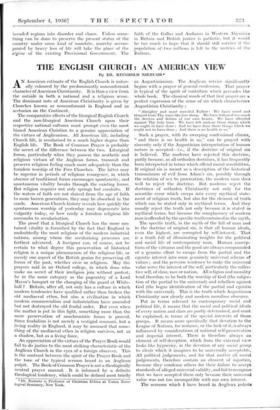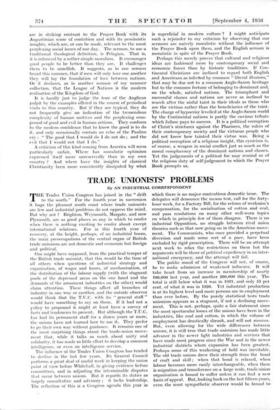THE ENGLISH CHURCH : AN AMERICAN VIEW
By DR. REINHOLD NIEBUHR*
AN American estimate of the English Church is natur- ally coloured by the predominantly nonconformist character of American Christianity. It is thus a view from the outside in both a national and a religious sense. The dominant note of American Christianity is given by Churches known as nonconformist in England and as sectarian on the Continent.
The comparative effects of the liturgical English Church and the non-liturgical American Church upon their respective national cultures must prompt even the most biased American Christian to a genuine appreciation of the virtues of Anglicanism. All American life, including Church life, is secularised to a much higher degree than English life. The Book of Common Prayer is probably the secret of the difference between the two. Liturgical forms, particularly when they possess the aesthetic and religious virtues of the Anglican forms, transmit and preserve religious feeling much more adequately than the formless worship of the Free Churches. The latter may be superior in periods of religious resurgence, in which absence= of traditional forms encourages spontaneity, and spontaneous vitality breaks through the existing forms. But religion requires not only springs but conduits. If the waters of faith are not sluiced from the age of faith to thore barren generations, they may be absorbed in the sands. American Church history reveals how quickly the spontaneous worship of yesterday may degenerate into vulgarity today, or how easily a formless religious life succumbs to secularisation.
The proof that a liturgical Church has the more sus- tained vitality is furnished by the fact that England is undoubtedly the most religious of the modern industrial nations, among whom the secularising processes are farthest advanced. A foreigner can, of course, not be certain to what degree this preservation of historical religion is a unique phenomenon of the religious life, or merely one aspect of the British genius for preserving all forms of the past, whether civic or religious. May the prayers said in an Oxford college, in which dons who make no secret of their irreligion join without protest, be in the same category as the pageantry of a Lord Mayor's banquet or the changing of the guard at White- hall ? Britain, after all, not only has a culture in which modern tendencies have qualified rather than broken the old mediaeval ethos, but also a civilisation in which modern commercialism and industrialism have amended but not destroyed the old feudal order. But even when the matter is put in this light, something more than the mere preservation of anachronistic forms is proved. Since feudalism is not merely a vestigial remnant, but a living reality in England, it may be assumed that some- thing of the mediaeval ethos in religion survives, not as a shadow, but as a living force.
An appreciation of the virtues of the Prayer Book would fail to do justice to the most striking characteristic of the Anglican Church in the eyes of a foreign observer. This is the contrast between the spirit of the Prayer Book and the tone of the typical sermon heard in an Anglican pulpit. The Book of Common Prayer is not a theologically neutral prayer manual. It is informed by a definite theological tendency, which could be defined most briefly
* Dr. Niebuhr is Professor of Christian Ethics at Union Theo- logical Seminary, New York.
as Augustinianism. The Anglican service significantly begins with a prayer of general confession. That prayer is typical of the spirit of contrition which pervades the whole book. The classical words of that first prayer are a perfect expression of the sense of sin which characterises Augustinian Christianity : "-Almighty and most merciful Father : We have erred and strayed from Thy ways like lost sheep. We have followed too much the devices and desires of our own hearts. Wo have offended against Thy holy laws. We have left undone those things which we ought to have done ; And we have done those things which we ought not to have done ; And there is no health in us."
Such a prayer, with its sweeping confessional climax, " and there is no health in us," can be prayed with sincerity only if the Augustinian interpretation of human nature is accepted—i.e., if the doctrine of original sin is believed. The moderns have rejected this doctrine, partly because, as all orthodox doctrines, it has frequently been interpreted in terms which offend moral sensibilities. If original sin is meant as a description of the historical transmission of evil from Adam's sin, possibly through the relation of sex to procreation, the modern man does well to reject the doctrine. But moderns reject the doctrines of orthodox Christianity not only for the scientific error which creeps into every mythical state- ment of religious truth, but also for the element of truth which can be stated only in mythical terms. And they usually reject the truth not only because it is stated in mythical terms, but because the complacency of modern man is offended by the specific truth contained in the myth.
The specific truth, in the myth of the fall of man and in the doctrine of original sin, is that all human ideals, even the highest, are corrupted by self-interest. That is a truth full of illuminating insights for the political and social life of contemporary man. Human concep- tions of the virtuous and the good are always compounded of a genuine effort to escape from the partial and the egoistic interest into some genuinely universal scheme of values ; and the perverse tendency to make the universal value serve. the interest of the self, particularly the collec- tive self, of class, race or nation. All religion and morality tend therefore to be both the worship of God (the subjec- tion of the partial to the universal) and rebellion against God (the bogus identification of the partial and egoistic with the universal). This is the truth which Augustinian Christianity saw clearly and modern moralism obscures.
Put in terms relevant to contemporary social and political life, it means that the social and political ideals of every nation and class are partly determined, and must be explained, in terms of the special interests of those groups. It means more specifically that devotion to the League of Nations, for instance, or the lack of it, is always influenced by considerations of national self-preservation and imperial interest. There is therefore always an element of self-deception, which from the external view looks like hypocrisy, in the devotion of any social group to ideals which it imagines to be universally acceptable. All political judgements, and for that matter all moral judgements, therefore contain an element of injustice, because they condemn others for their failure to accept standards of alleged universal validity, and fail to recognise that we have accepted them only because their universal value was not too incompatible with our own interest.
The sermons which I have heard in Anglican pulpits are in striking contrast to the Prayer Book " With. its Augustinian sense of contrition and with its pessimistic insights, which are, or can be made, relevant to the most perplexing social issues of our day. The sermon, to use a traditional theological definition, is Pelagian. That is, it is informed by a rather simple moralism. It encourages good people to be better than they are. It challenges them to be .unselfish. It suggests, as in one sermon heard this summer, that if men will only love one another they will lay the foundation of love between nations. Or it declares, as in another sermon of my summer collection, that the League of Nations is the modern realisation of the Kingdom of God.
It is hardly just to judge the tone of the Anglican pulpit by the examples offered in the course of periodical visits to this country. But if they are typical, they do not frequently give an indication of the tremendous complexity of human motives and the perplexing com- pound of good and evil in human actions. They conform to the modern confidence that to know the good is to do it, and only occasionally contain an echo of the Pauline cry : " The good that I would do I do not do ; and the evil that I would not that I do."
A criticism of this kind coming from America will seem particularly unfair. Where has moralistic optimism expressed itself more unreservedly than in my own country ? And where have the insights of classical Christianity been more consistently dissipated by what is superficial in modern culture ? I might anticipate such a rejoinder to my criticism by observing that our sermons are naively moralistic without the influence of the Prayer Book upon them, and the English sermon is moralistic in spite of the Prayer Book.
Perhaps this merely proves that cultural and religious ideas are fashioned more by contemporary social and economic forces than by historic traditions. If Con- tinental Christians are inclined to regard both English and. Americans as infected by common " liberal illusions," that may be due not to a common Anglo-Saxon heritage but to the common fortune of belonging to dominant and, on the whole, satisfied nations. The triumphant and successful classes and nations are never as inclined to search after the sinful taint in their ideals as those who are the victims rather than the beneficiaries of the taint. The charge of hypocrisy levelled at the Anglo-Saxon world by the Continental nations is partly the envious tribute which failure pays to success. It is a political corruption of Christ's strictures against the Pharisees, the rulers of their contemporary society and the virtuous people who did not know how tainted their virtue was. Being a political corruption of a religious insight, this cynicism is, of course, a weapon in social conflict just as much as the moral complacency of the dominant nations and classes. Yet the judgements of a political foe may remind us of the religious duty of self-judgement to which the Prayer Book prompts us.







































 Previous page
Previous page